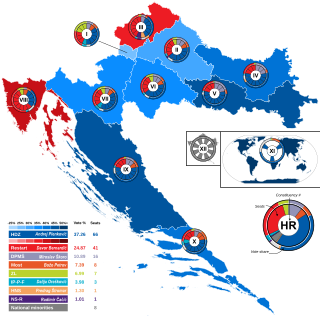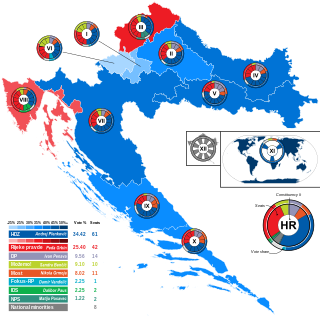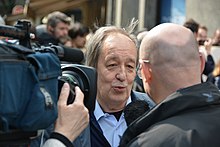
Parliamentary elections to elect all 151 members of the Croatian Parliament were held on 23 November 2003. They were the fifth parliamentary elections to take place since the first multi-party elections in 1990. Voter turnout was 61.7%. The result was a victory for the opposition Croatian Democratic Union (HDZ) which won a plurality of 66 seats, but fell short of the 76 needed to form a government. HDZ chairman Ivo Sanader was named the eighth Prime Minister of Croatia on 23 December 2003, after parliament passed a confidence motion in his government cabinet, with 88 MPs voting in favor, 29 against and 14 abstaining. The ruling coalition going into the elections, consisting of the Social Democratic Party (SDP), Croatian People's Party (HNS), Croatian Peasant Party (HSS), Party of Liberal Democrats (Libra) and the Liberal Party (LS), did not contest the elections as a single bloc; the SDP ran with the Istrian Democratic Assembly (IDS), the Party of Liberal Democrats (Libra) and the Liberal Party, HNS ran with the Alliance of Primorje-Gorski Kotar (PGS) and the Slavonia-Baranja Croatian Party (SBHS), while HSS ran on its own.

The Croatian Parliament or the Sabor is the unicameral legislature of Croatia. Under the terms of the Croatian Constitution, the Sabor represents the people and is vested with legislative power. The Sabor is composed of 151 members elected to a four-year term on the basis of direct, universal and equal suffrage by secret ballot. Seats are allocated according to the Croatian Parliament electoral districts: 140 members of the parliament are elected in multi-seat constituencies. An additional three seats are reserved for the diaspora and Croats in Bosnia and Herzegovina, while national minorities have eight places reserved in parliament. The Sabor is presided over by a Speaker, who is assisted by at least one deputy speaker.

The Social Democratic Party of Croatia is a social-democratic political party in Croatia. The SDP is anti-fascist, progressive, and strongly pro-European. The SDP was formed in 1990 as the successor of the League of Communists of Croatia, the Croatian branch of the League of Communists of Yugoslavia, which had governed Croatia within the Socialist Federal Republic of Yugoslavia since World War II.
The Istrian Democratic Assembly is a centre to centre-left, regionalist, liberal political party in Croatia primarily operating in Istria County.

Parliamentary elections were held in Croatia on 29 October 1995 to elect the 127 members of the Chamber of Representatives. The election was held in conjunction with special elections for Zagreb City Assembly, which resulted in the Zagreb Crisis.

Parliamentary elections were held in Croatia on 3 January 2000 to elect members of the Chamber of Representatives.

Parliamentary elections were held in Croatia on 25 November 2007 and for overseas voters on 24 and 25 November. The campaign officially started on 3 November. The President of Croatia announced elections on 17 October and 14 days were allowed for candidate lists to be submitted.
The Croatian Parliament electoral districts are the special territorial subdivision of Croatia used for the country's parliamentary elections.

Parliamentary elections were held in Croatia on 8 November 2015. All 151 seats in the Parliament were up for election. This parliamentary election was the 8th since the first multi-party election in 1990 and the first since Croatia joined the European Union in 2013. The ruling center-left Croatia is Growing coalition, led by Prime Minister Zoran Milanović, was challenged by the center-right Patriotic Coalition led by the HDZ and headed by its party chairman Tomislav Karamarko, and also faced several new political coalitions.

Italians of Croatia are an autochthonous historical national minority recognized by the Constitution of Croatia. As such, they elect a special representative to the Croatian Parliament. There is the Italian Union of Croatia and Slovenia, which is a Croatian-Slovenian joint organization with its main site in Rijeka, Croatia and its secondary site in Koper, Slovenia.

Parliamentary elections were held in Croatia on 5 July 2020. They were the tenth parliamentary elections since the first multi-party elections in 1990 and elected the 151 members of the Croatian Parliament. 140 Members of Parliament were elected from geographical electoral districts in Croatia, three MPs were chosen by the Croatian diaspora and eight MPs came from the ranks of citizens registered as belonging to any of the 22 constitutionally recognized national minorities.

Robert Podolnjak is a Croatian associate professor of constitutional law and politician who served as chairman of the Croatian Parliament's Committee on the Constitution, Standing Orders and Political System between January 2016 and June 2017. Podolnjak was elected to the Croatian Parliament at the 2015 and 2016 parliamentary elections as representative for III electoral district. He is member of the Bridge of Independent Lists party.

Peđa Grbin is a Croatian lawyer and politician serving as president of the Social Democratic Party (SDP) since 2020. He was also Leader of the Opposition from 2020 until 2022, when he was replaced by Davorko Vidović, the leader of the Social Democrats. He has represented the VIII electoral district in the Croatian Parliament since 2011.

Silvano Hrelja is a Croatian politician who has been Leader of the Croatian Party of Pensioners (HSU) since 2008 and a member of the Croatian Parliament for the VIII electoral district since 2003 having been elected in the 2003, 2007, 2011 and 2015 parliamentary elections.

Parliamentary elections were held in Croatia on 17 April 2024 to elect the members of the 11th Sabor. Prior to the elections, the government consisted of a coalition of the Croatian Democratic Union and Independent Democratic Serb Party, with parliamentary support of five national minority MPs, two MPs from the Croatian Social Liberal Party and Croatian Demochristian Party, and one independent MP, Silvano Hrelja.

Zvane (Ivan) Črnja was a prominent Croatian poet, prose writer, essayist, culturologist, screenwriter, playwright and filmologist, journalist, publicist, polemicist and publisher. He's considered one of the most important names that Istria gave to Croatia in the 20th century. His aliases include: Osip Suri, Barba Zvane, and Filus.
Ivan Corrado Pauletta was an Istrian Italian politician, journalist and writer active in Croatia.













